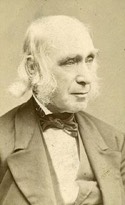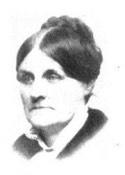Mays Family Tree - Person Sheet
Birth Date29 Nov 1799
Birth PlaceWolcott, New Haven Co, CT, USA
Death Date4 Mar 1888 Age: 88
Burial PlaceSleepy Hollow Cemetery, Concord, Middlesex Co., MA, USA315
OccupationTeacher, Writer, Philosopher, and Reformer
Cause of DeathParalysis5375
FatherJoseph Chatfield ALCOTT (1771-)
MotherAnna BRONSON
Misc. Notes
As an educator, Alcott pioneered new ways of interacting with young students, focusing on a conversational style, and avoided traditional punishment. He hoped to perfect the human spirit and, to that end, advocated a vegan diet before the term was coined. He was also an abolitionist and an advocate for women's rights.
Alcott became friends with Ralph Waldo Emerson and became a major figure in transcendentalism. His writings on behalf of that movement, however, are heavily criticized for being incoherent.
Alcott is often criticized for his inability to earn a living and support his family; he often relied on loans from his brother-in-law, Emerson, and others. He was never financially secure until his daughter became a best-selling novelist.
The family originally spelled their name "Alcock", later changed to "Alcocke" then "Alcox". Amos Bronson, the oldest of eight children, later changed the spelling to "Alcott" and dropped his first name.
When teaching a day school in Philadelphia a former student would later refer to Amos as "the most eccentric man who ever took on himself to train and form the youthful mind.”
A January 1843 incident in which Amos refused to pay his poll tax of $1.50 inspired Henry David Thoreau to make a similar protest leading to a night in jail and his essay “Civil Disobedience.”
Alcott knew Henry David Thoreau who died on May 6, 1862, likely from an illness he caught from Alcott two years earlier. Alcott assisted in arranging Thoreau's funeral in the church he had resigned, at Emerson's request. Only two years later, neighbor Nathaniel Hawthorne died as well. Alcott served as a pallbearer along with Oliver Wendell Holmes, Sr., Henry Wadsworthg Longfellow and others.
In April 1882, Alcott's friend and benefactor Ralph Waldo Emerson was sick and bedridden. After visiting him, Alcott wrote, "Concord will be shorn of its human splendor when he withdraws behind the cloud." Emerson died the next day.
As he was bedridden at the end of his life, Alcott's daughter Louisa May came to visit him at Louisburg on March 1, 1888. He said to her, "I am going up. Come with me." She responded, "I wish I could.” He died three days later on March 4; Louisa May died only two days after her father.
[See more about Amos in his marriage notes and at the general source]
Spouses
Birth Date1800175
Death Date25 Nov 1877
Death PlaceConcord, Middlesex Co., MA, USA
FatherColonel Joseph MAY
Mother[Mother] SEWELL
Misc. Notes
Abby was a descendant of the Quincy and Sewell families of Boston.5375
Family ID10920
Marr Date22 May 18305373
Marr PlaceBoston, Suffolk Co., MA, USA
Marr Memoat Kings Chapel. Abby’s brother conducted the ceremony and a modest reception followed at her father's house
Misc. Notes
Amos and wife Abby had four surviving children, all daughters.
After their marriage the Alcotts moved to a boarding house at 12 Franklin Street in Boston.
In December 1830 they moved to Germantown, Philadelphia, PA
On April 10, 1833, the family moved to Philadelphia.
By September of 1834, they had moved back to Boston where he opened the Temple School.
In late April 1840 the Alcott’s moved to Concord, MA where he rented a home for $50 year within walking distance of friend Ralph Waldo Emerson’s house.
In June 1843 Amos moved his family to Harvard, MA to a farm "Fruitlands" despite only ten old apple trees on the property. The plan was to create a utopian society regaining access to Eden by finding the correct formula for perfect living, following specific rules governing agriculture, diet, and reproduction. In order to achieve this, they removed themselves from the economy as much as possible and lived independently avoiding interaction with local communities.
Calling themselves a "consociate family", they agreed to follow a strict vegetarian diet and to till the land without the use of animal labor. After some difficulty, they relented and allowed some cattle to be "enslaved”. They also banned coffee, tea, alcoholic drinks, milk, and warm bathwater. They only ate "aspiring vegetables" — those which grew upward — and refused those that grew downward like potatoes. As Alcott had published earlier, "Our wine is water,—flesh, bead,—drugs, fruits." For clothing, they prohibited leather because animals were killed for it, as well as cotton, silk, and wool, because they were products of slave labor. Alcott had high expectations but was often away when the community most needed him as he attempted to recruit more members.
The experimental community was never successful, partly because most of the land was not arable. Alcott lamented, "None of us were prepared to actualize practically the ideal life of which we dreamed. So we fell apart" In its seven months, only 13 people joined, included the Alcotts and Lanes [an associate]. Other than Abby May and her daughters, only one other woman joined.
In January 1844, Alcott moved his family to Still River, a village within Harvard but, on March 1, 1845, the family returned to Concord to live in a home they named "The Hillside". The Alcotts hosted a steady stream of visitors at The Hillside, including fugitive slaves, which they hosted in secret as a station of the Underground Railroad.
In 1848, Abby May insisted they leave Concord, which she called "cold, heartless, brainless, soulless". The Alcott family put The Hillside up for rent and moved to Boston. There, next door to Peabody's book store on West Street, Bronson Alcott hosted a series based on the "Conversations" model by Margaret Fuller called "A Course on the Conversations on Man — his History, Resources, and Expectations". Participants, both men and women, were charged three dollars to attend or five dollars for all seven lectures.
Alcott and his family moved back to Concord after 1857, where he and his family lived in the Orchard House until 1877.
Alcott voted in a presidential election for the first time in 1860. In his journal for November 6, 1860, he wrote: "At Town House, and cast my vote for Lincoln and the Republican candidates generally — the first vote I ever cast for a President and State officers."
5376
After their marriage the Alcotts moved to a boarding house at 12 Franklin Street in Boston.
In December 1830 they moved to Germantown, Philadelphia, PA
On April 10, 1833, the family moved to Philadelphia.
By September of 1834, they had moved back to Boston where he opened the Temple School.
In late April 1840 the Alcott’s moved to Concord, MA where he rented a home for $50 year within walking distance of friend Ralph Waldo Emerson’s house.
In June 1843 Amos moved his family to Harvard, MA to a farm "Fruitlands" despite only ten old apple trees on the property. The plan was to create a utopian society regaining access to Eden by finding the correct formula for perfect living, following specific rules governing agriculture, diet, and reproduction. In order to achieve this, they removed themselves from the economy as much as possible and lived independently avoiding interaction with local communities.
Calling themselves a "consociate family", they agreed to follow a strict vegetarian diet and to till the land without the use of animal labor. After some difficulty, they relented and allowed some cattle to be "enslaved”. They also banned coffee, tea, alcoholic drinks, milk, and warm bathwater. They only ate "aspiring vegetables" — those which grew upward — and refused those that grew downward like potatoes. As Alcott had published earlier, "Our wine is water,—flesh, bead,—drugs, fruits." For clothing, they prohibited leather because animals were killed for it, as well as cotton, silk, and wool, because they were products of slave labor. Alcott had high expectations but was often away when the community most needed him as he attempted to recruit more members.
The experimental community was never successful, partly because most of the land was not arable. Alcott lamented, "None of us were prepared to actualize practically the ideal life of which we dreamed. So we fell apart" In its seven months, only 13 people joined, included the Alcotts and Lanes [an associate]. Other than Abby May and her daughters, only one other woman joined.
In January 1844, Alcott moved his family to Still River, a village within Harvard but, on March 1, 1845, the family returned to Concord to live in a home they named "The Hillside". The Alcotts hosted a steady stream of visitors at The Hillside, including fugitive slaves, which they hosted in secret as a station of the Underground Railroad.
In 1848, Abby May insisted they leave Concord, which she called "cold, heartless, brainless, soulless". The Alcott family put The Hillside up for rent and moved to Boston. There, next door to Peabody's book store on West Street, Bronson Alcott hosted a series based on the "Conversations" model by Margaret Fuller called "A Course on the Conversations on Man — his History, Resources, and Expectations". Participants, both men and women, were charged three dollars to attend or five dollars for all seven lectures.
Alcott and his family moved back to Concord after 1857, where he and his family lived in the Orchard House until 1877.
Alcott voted in a presidential election for the first time in 1860. In his journal for November 6, 1860, he wrote: "At Town House, and cast my vote for Lincoln and the Republican candidates generally — the first vote I ever cast for a President and State officers."
5376
ChildrenAnna Bronson (1831-1893)
[Son] (Stillborn) (1831-1831)
Louisa May (1832-1888)
Elizabeth “Lizzie” Sewell (1835-1858)
Abby May (1840-1879)



